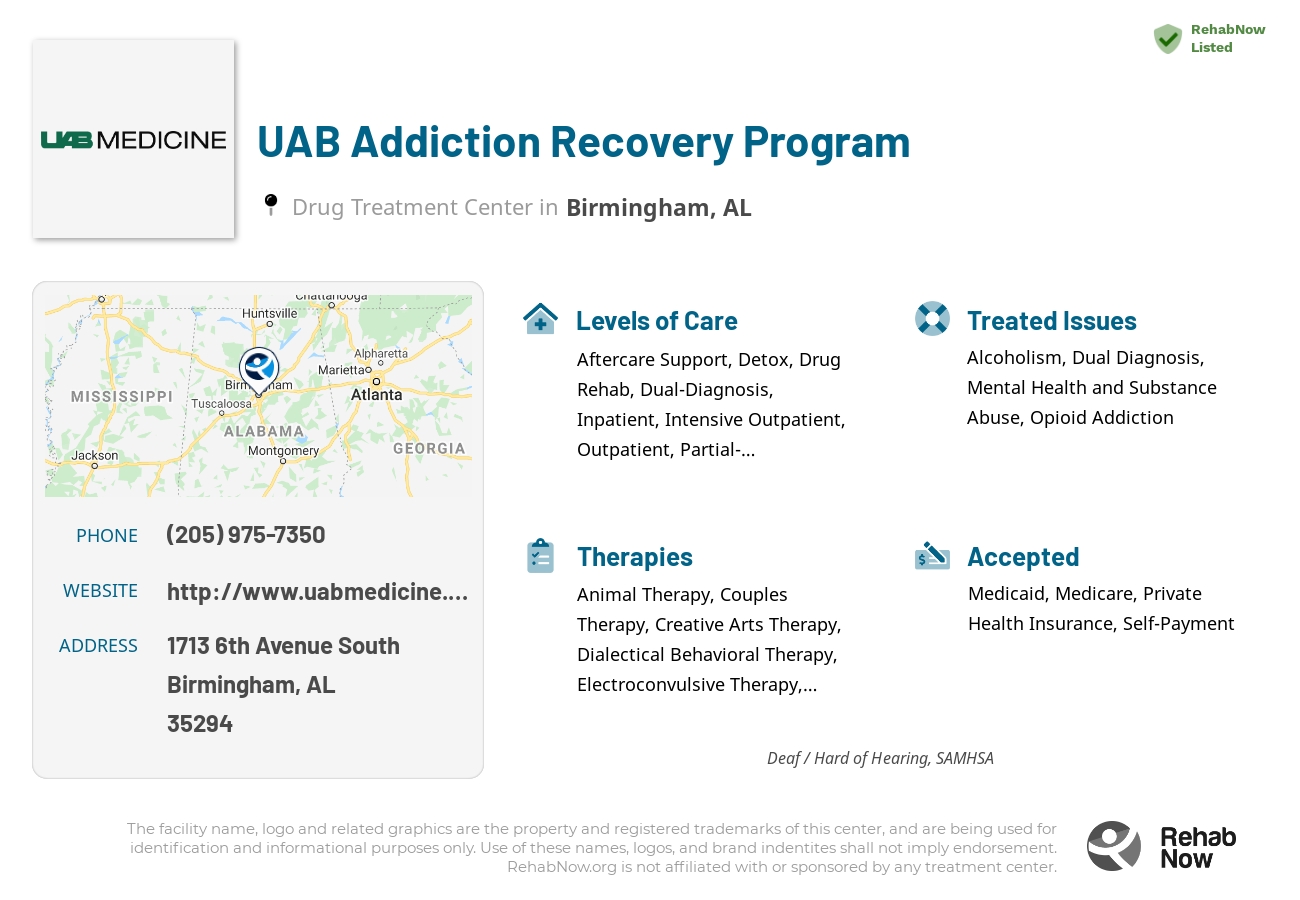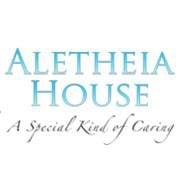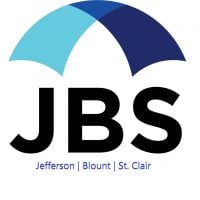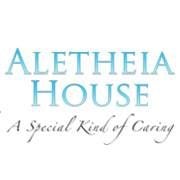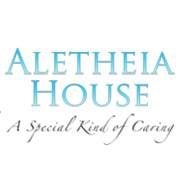UAB Addiction Recovery Program
Drug Rehab Center in Birmingham, Alabama
The UAB Addiction Recovery Program provides evidence-based, tailored addiction treatment services, including medication-assisted treatment, family therapy, and mindfulness-based cognitive behavior therapy, for individuals with substance use disorders and co-occurring mental health issues.
About This Alabama Facility
The UAB Addiction Recovery Program at the University of Alabama at Birmingham School of Medicine is a comprehensive facility providing quality addiction treatment services in Birmingham, Alabama. Patients in their care receive evidence-based care for a wide range of substance use disorders and associated mental health disorders. All recovery programs are tailored to individual needs and overseen by licensed professionals to ensure safety and effectiveness.
UAB Addiction Recovery Program provides a variety of services for the treatment and recovery from addiction or substance use disorders. This includes medication-assisted treatment, intensive outpatient programs, family therapy and counseling, mindfulness-based cognitive behavior therapy, and relapse prevention. Additionally, they offer support and resources for individuals with co-occurring mental health issues such as depression, anxiety, and post-traumatic stress disorder. Their goal is to provide a comprehensive approach to recovery, emphasizing client-centered services which include education, job training, spiritual guidance and connections to community-based support services.
UAB Addiction Recovery Program is fully accredited by the Joint Commission and holds the coveted “Gold Seal of Approval”. They have also been recognized by both the federal and state governments for providing higher than average success rates in their recovery programs. Additionally, UAB Addiction Recovery Program offers specialized programs for adolescents, as well as alternative therapies such as art and music therapy for individuals who respond well to non-traditional treatment methods.
Genders
Ages
Modality
Additional
Accreditations
SAMHSA
Conditions and Issues Treated
Opioid addiction is the result of repeated use, or abuse, of opioid drugs. It is recommended for people who are dependent on opioids, or who have a high risk for dangerous health concerns, to seek professional treatment. Treatment plans usually include behavioral therapy and medication-assisted treatment.
Opioid drugs include: fentanyl, heroin, methadone, oxycodone, and oxymorphone.
Opioid addiction treatment is beneficial for:
- People who have a history of severe withdrawal.
- People with a high risk for dangerous health concerns.
- People having difficulty overcoming opioid addiction on their own.
There are different kinds of Dual Diagnosis:. A person who simultaneously experiences both a mental illness and an addiction disorder. Or, a person who experiences one or more coexisting (simultaneous) mental health conditions in addition to a primary substance use disorder.
The treatment requires a multi-disciplinary approach, it’s crucial for individuals to partner up with a healthcare provider who understands all the recovery components.
Levels of Care Offered at UAB Addiction Recovery Program
This center offers a variety of custom treatment tailored to individual recovery. Currently available are Aftercare Support, Detox, Drug Rehab, Dual-Diagnosis, Inpatient, Intensive Outpatient, Outpatient, Partial-Hospitalization, with additional therapies available as listed below.
Detox is the stage of recovery where the drugs or alcohol are entirely removed from your body. There are two different ways to detox, with medications and without. For many drugs and alcohol, the acute phase of detox can be completed in a number of days.
Inpatient treatment is the most intensive level of care, and it’s necessary for those who aren’t able to control their addiction. These patients also must be drug-free before attending inpatient programs .
During inpatient treatment, addicts live at an inpatient facility 24 hours a day while receiving help. This type of program is generally recommended for those who need to go through detoxification or who are struggling with serious addiction-related issues.
An Intensive Outpatient Program (IOP) is a form of drug treatment that allows individuals to receive the therapy they need while remaining in their homes and community.
An IOP is typically 3-5 days per week, at least 4 hours each day of treatment. Treatment can last for a few months or longer, depending on the situation.
An IOP is a step down from an inpatient treatment center and can be used as a step down from an inpatient stay or as a more intense form of outpatient treatment. IOPs allow for the flexibility to continue working and living at home while still meeting treatment demands.
The outpatient programs in Birmingham, AL are for those addicted drugs or alcohol. The goal of the outpatient rehabilitation program is to make them stop abusing drugs or alcohol, reduce drug use or addictive behaviors, and become entirely sober. It is generally required to attend the outpatient program for 10-12 hours every week.
Patients can be administered on-the-spot medication to ease withdrawal symptoms such as anxiety, increased heart rate, and even depression. Groups such as Alcoholics Anonymous (AA) and Narcotics Anonymous (NA) can be used as a part of outpatient treatment to help maintain sobriety.
A Partial Hospitalization Program (PHP), also known as an Aftercare Program, is a short-term intensive treatment program usually consisting of five (5) days a week. A PHP can be an effective alternative for those who cannot commit to living in a rehab facility 24/7 but require daily medical supervision. A PHP provides comprehensive addiction services seven (7) days a week and is usually attended by the addict every day.
This allows addicts to continue working, stay close to their family and friends, and minimize disruptions to their daily routines. Upon entering a PHP, patients are assessed by Addiction Psychiatrists, Medical Doctors (MD), Nurses, Psychologists, and Therapists. This assessment will determine the appropriate level of care.
Although PHP’s are similar to residential programs, they lack 24-hour supervision. This is because aftercare patients are still expected to follow the rules of their recovery and meet specific goals. This will allow them to assimilate back into society without relapse.
Aftercare support is a service many addicts need to ensure their success at recovery. This service usually includes one-on-one or group therapies, assistance from a sponsor and other types of help designed to make sure the patient continues living a life free from drugs.
Patients also may require medication to help them battle addiction. Some people have been able to successfully recover without additional medications, but others have found that they need help during their transition. Long-term, the patient must take the initiative to attend meetings and receive help from other addicts in recovery.
Therapies & Programs
People in addiction recovery can benefit from individual therapy. This type of therapy involves meeting with a therapist one-on-one. This allows for a personal and trusting relationship to be built so that the patient can be truly themselves and express any emotions they feel. Individual therapy leads to greater understanding and peace about your triggers for addiction and coping strategies to prevent relapse.
Couples therapy for drug addiction is based on the belief that addiction is a family disease. Everyone involved with an addict, not just the addict themselves, is affected by their behavior and the changes the addict goes through. The relationship also changes the addict’s significant other and has likely picked up some codependent behaviors. Codependency is a term used to describe a person obsessed with another person and their needs and feelings while neglecting their own. Addicts are usually people-pleasers, so it is understandable how one can become codependent in relationships with addicts.
Family therapy is a type of group problem-solving that aims to improve communication and relationships between the patient, their family, and sometimes friends. The main goal of family therapy for drug addiction is to create an environment where communication can occur without judgment, hostility, or blame. The therapist is with the family as they learn to communicate with each other differently, especially with the addict when s/he is using.
Group therapy sessions are held in rehab facilities, clinics, churches or community centers that offer drug addiction treatment. People who attend these groups are encouraged to voice their feelings and support other addicts in recovery. This helps group members strengthen their own recovery program while cheering on others who are struggling with sobriety.
Group therapy sessions provide recovering addicts with a chance to cope with everyday situations that many face. Group therapy sessions are held in rehab facilities, clinics, churches or community centers that offer drug addiction treatment.
People who attend these groups are encouraged to voice their feelings and support other addicts in recovery. This helps group members strengthen their own recovery program while cheering on others who are struggling with sobriety.
If you’re looking for addiction treatment, it’s important to find a facility that offers trauma therapy. This type of therapy helps people process and understand the past traumas that have led to their addiction. Trauma therapists will work with clients to help them understand their past and present relationships and show them that they are worthy of love. This therapy is typically done using visualization, discussion, and writing down thoughts and feelings.
Trauma Therapy is a form of therapy that involves working with a patient to help them process and understand the past trauma(s) in their life. This therapy is typically done using techniques such as visualization, discussion, and writing down thoughts and feelings. The main goals of trauma therapy is to help clients express their emotions and talk about what they are feeling.
Dialectical Behavior Therapy (DBT) is a form of cognitive-behavioral therapy that helps people understand how they connect their thoughts, behaviors, and feelings. It can give them more control over their actions, effectively stopping self-harm ideations and attempts in some patients. It also helps put those with borderline personality disorder into control for managing mental struggles.
A new study has shown that DBT works for those with self-harm behaviors and addictions by giving them therapy they can relate to and understand.
Cognitive Behavioral Therapy (CBT) helps addicts identify faulty, negative thinking so that they can work together with the therapist to find healthier ways of thinking. CBT focuses on specific aspects of each person’s thinking, feeling, physiology, and behavior. It aims to identify specific problems in these areas, and create a personalized treatment strategy.
Addicts often experience intense cravings for sugary foods during recovery. By teaching addicts how to eat well and stay healthy, therapists can help them manage their cravings over the course of treatment.
During these sessions, Birmingham, Alabama dietitians and therapists will offer advice about healthy eating options and teach addicts how to make specific changes in their diet that can help reduce the effects of cravings during recovery.This type of therapy is often used in conjunction with other types of addiction treatment services. By identifying specific triggers and developing strategies to help addicts avoid relapse, most individuals can overcome their cravings and stay sober for good after they finish rehab.
The first step to becoming a non-smoker is the choice to quit smoking. Nicotine replacement therapies are effective because they provide you with the nicotine you are addicted to without inhaling carcinogens from cigarettes.
There are several types of NRT. These include:
- Nicotine gum
- Nicotine patches (transdermal systems)
- Nasal spray
- Lozenges
The benefits to using NRT can include:
- Reduce the risk of heart disease and cancer
- Reduce the anxiety and irritability associated with quitting smoking
- Reduce the risk of type II diabetes.
- Improved fertility in women
Patient Experience
Creative Arts
Creative Arts Therapy is a treatment method for patients of UAB Addiction Recovery Program in Birmingham, Alabama who are victims of addiction to drugs, alcohol, or other substances. Group Creative Arts Therapy sessions help addicts get sober by allowing them to meet and talk with peers who are going through the same problems. This builds trust and helps addicts understand that they are not alone. Depending on the severity of the patient’s drug or alcohol problem, they may attend group creative art therapy sessions or individual sessions.Experiential Therapy at UAB Addiction Recovery Program
Experiential Therapy allows addicts to release emotions in a safe environment. The process involves addicts painting their feelings and releasing them on a canvas. LPE – Love, Peace, and Equilibrium is one of the most popular forms of experiential therapy.
Equine Therapy at UAB Addiction Recovery Program
Just spending time with a horse can provide a person with significant psychological benefits due to their unique ability to encourage unconditional love and acceptance in people. The calming presence these animals provide is invaluable to many people dealing with addiction and mental health disorders.
Fitness Therapy
Fitness therapy is beneficial in drug treatment programs. It provides an alternate coping mechanism for stress, a new outlook on life, and a sense of community and involvement (NIDA, 2002). It is especially useful for those who were formerly involved in organized sports.
Additional benefits of fitness therapy are enhanced physical appearance, an improved body image, and socialization with like-minded individuals. Due to fitness therapy, patients are less likely to relapse into drug addiction. Fitness therapy leads to a reduction in depression, anxiety, and stress. It can even help to improve memory and concentration.
Payment Options Accepted
For specific insurance or payment methods please contact us.
Is your insurance accepted?
Ask an expert, call (888) 674-0062
University of Alabama Associated Centers
Discover treatment facilities under the same provider.
- University of Alabama at Birmingham - Addiction Recovery Program in Birmingham, AL
- UAB Center for Psychiatric Medicine in Birmingham, AL
- University of Alabama at Birmingham - Beacon Addiction Treatment Center in Birmingham, AL
- University of Alabama at Birmingham - Addiction Treatment in Birmingham, AL
- UAB Hospital - Psychiatric Medicine in Birmingham, AL
Learn More About University of Alabama Centers
Additional Details
Specifics, location, and helpful extra information.
Birmingham, Alabama 35294 Phone Number(205) 975-7350 Meta DetailsUpdated November 25, 2023
Staff Verified
Patient Reviews
There are no reviews yet. Be the first one to write one.
Birmingham, Alabama Addiction Information
Opioids, such as heroin, fentanyl, and prescription opioids are related to more than half of all drug-related overdoses in Alabama. Alcohol is the most frequently used substance in Alabama; 85,000 Alabamians use cocaine every single year. In Alabama, there are four times as many vehicle crashes involving alcohol as there are normal vehicle crashes.
Birmingham, Alabama has a moderate level of drug addiction and abuse problems. 15.8% of people in Birmingham, Alabama abuse drugs, while 9.8% of people in Birmingham, Alabama are addicted to drugs. In 2015, there were 648 drug-related arrests in Birmingham. The most common age group for drug-related arrests is 21-25 years old. Most rehab facilities will offer a variety of therapies and treatments to help patients overcome their addictions.
Treatment in Nearby Cities
- Bay Minette, AL (190.0 mi.)
- Marion, AL (67.3 mi.)
- Tuscaloosa, AL (48.7 mi.)
- Sheffield, AL (101.1 mi.)
- Thorsby, AL (41.1 mi.)
Centers near UAB Addiction Recovery Program
The facility name, logo and brand are the property and registered trademarks of UAB Addiction Recovery Program, and are being used for identification and informational purposes only. Use of these names, logos and brands shall not imply endorsement. RehabNow.org is not affiliated with or sponsored by UAB Addiction Recovery Program.



